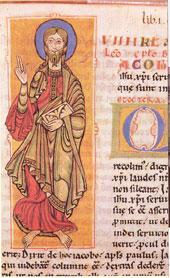
The Codex Calixtinus (or Codex Compostellus) is a manuscript that is the main witness for the 12th-century Liber Sancti Jacobi ('Book of Saint James'), a pseudepigraph attributed to Pope Calixtus II. The principal author or compiler of the Liber is thus referred to as "Pseudo-Calixtus", but is often identified with the French scholar Aymeric Picaud. Its most likely period of compilation is 1138–1145.[1]
It was intended as an anthology of background detail and advice for pilgrims following the Way of Saint James to the shrine of the apostle Saint James the Great, located in the cathedral of Santiago de Compostela, Galicia. The collection includes sermons, reports of miracles and liturgical texts associated with Saint James, and a set of polyphonic musical pieces. In it are also found descriptions of the route, works of art to be seen along the way, and the customs of the local people.